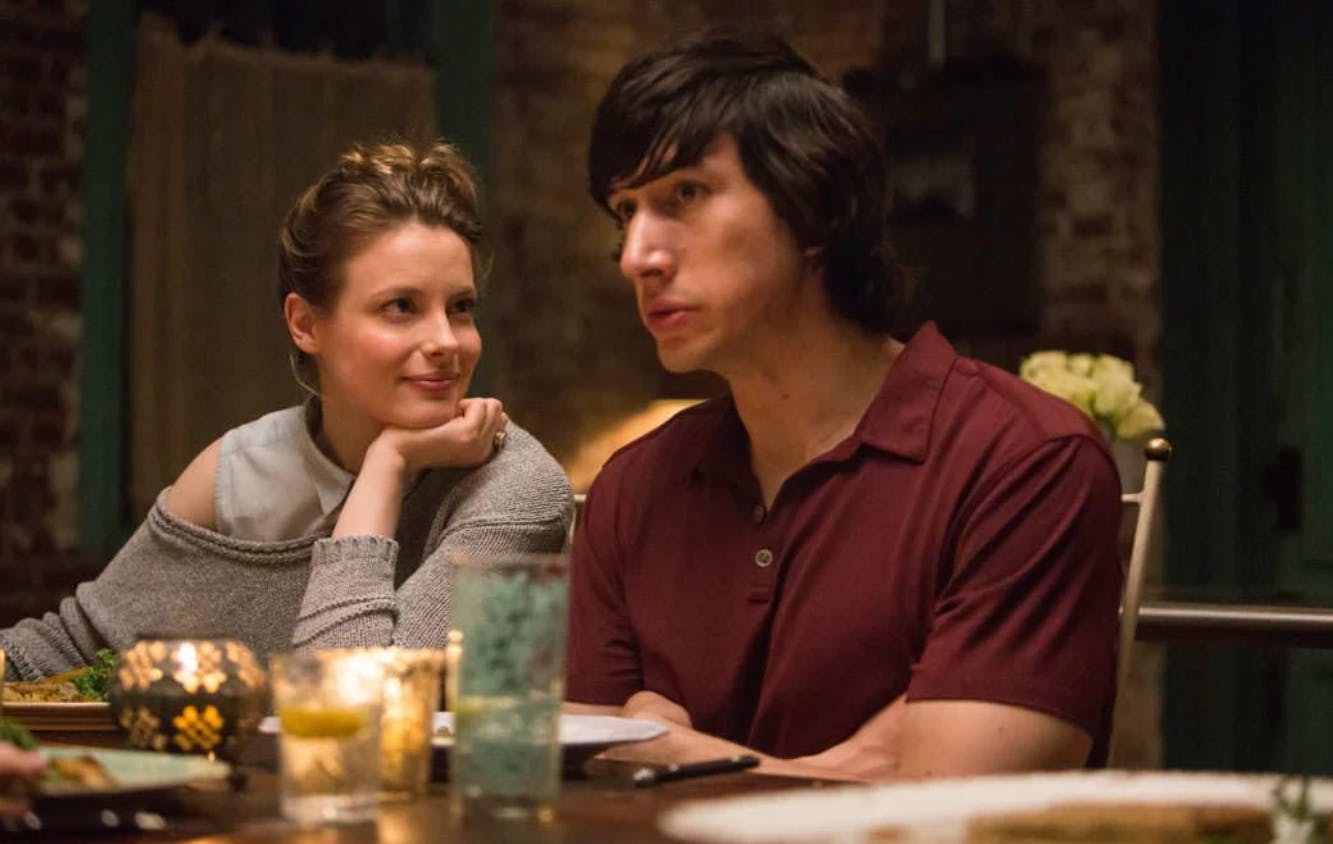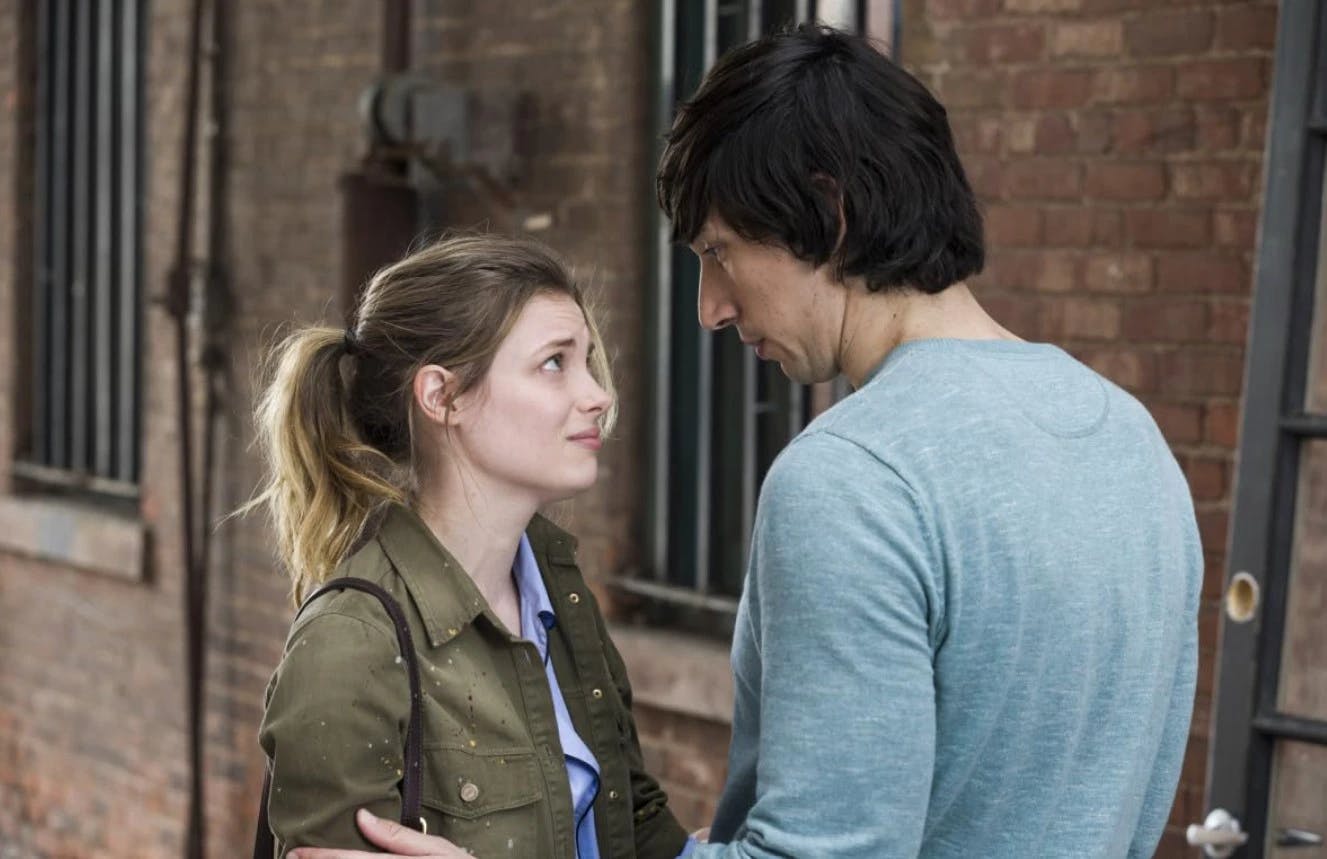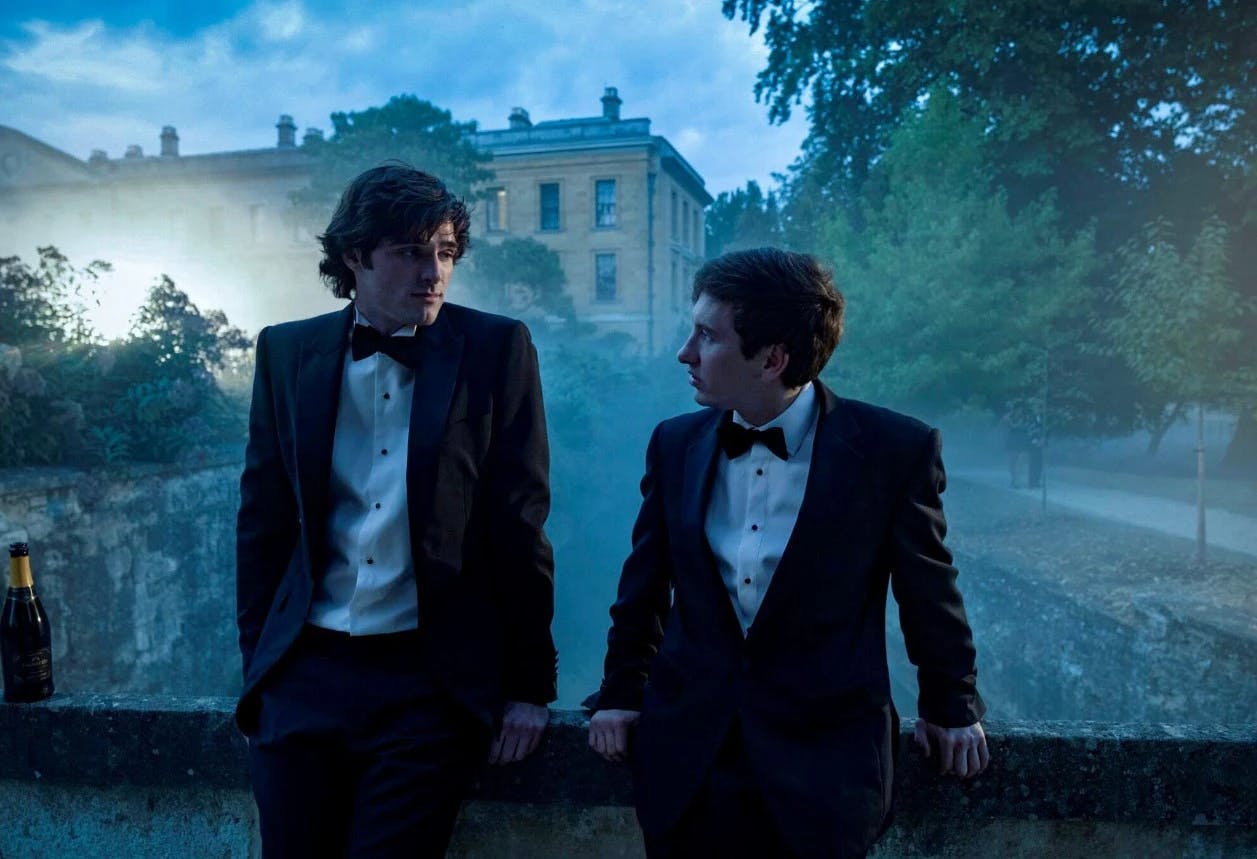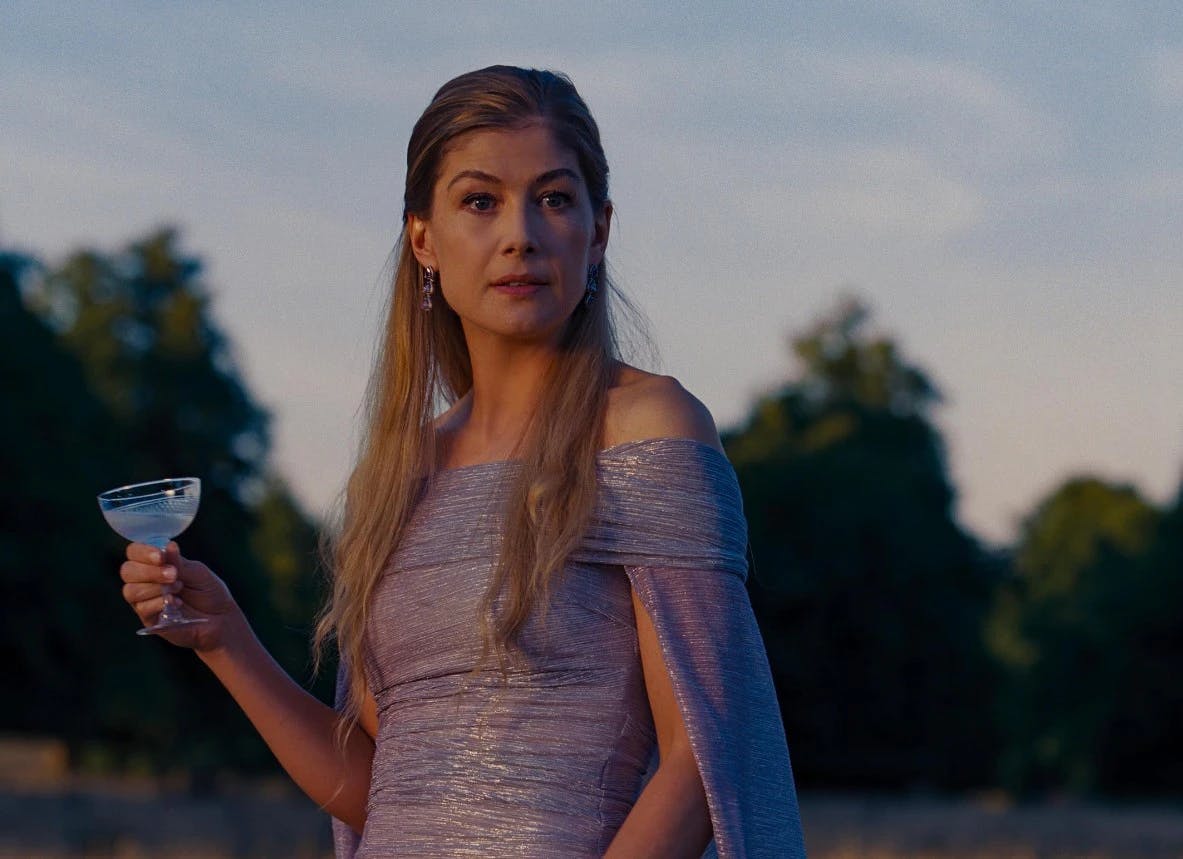“Saltburn” Is To Leftists What HBO's “Girls” Is To Conservatives
Conservatives and liberals have never seen eye to eye in their interpretation of art, be it music, film, paintings, or television.

The liberal, possessing a temperament of high openness to experience but low conscientiousness, is poised to lean into their creative nature. They embrace uncertainty and abstractions, and are more comfortable with chaos. The conservative, by contrast, is dealt a rather straightforward outlook, with their low openness to experience but high conscientiousness, which poises them to prefer rigid social norms, structure, and achievement-striving.
These polarizations in temperament create differing preferences in art consumption. Preference for clear, structured answers is conservative by nature, making them averse to complex, abstract works of art. The liberal, meanwhile, finds himself drawn toward the convoluted due to his preference for ambiguity and acceptance of unconventional behaviors. Watching the two camps interact with art in the wild is admittedly like an amusing episode of National Geographic. This brings us to our two shining examples and the jarring polarity of opinion they exude through liberals and conservatives – HBO’s six-season television drama Girls and Emerald Fennell’s recent 2023 film Saltburn.
*This article is intended for readers 18 and older.*
HBO’s Girls: Are We Supposed to Like Them?
Girls recently popped its head back into the zeitgeist despite being off the air since 2017. A series of videos along with social commentary on the material circulated on X, prompting renewed discourse around the hit HBO show. The show followed aspiring writer Hannah, her boyfriend Adam, and her three friends Marnie, Jessa, and Shoshanna as they navigate life in New York City. The first episode revolves around Hannah's parents cutting her off financially. We watch her struggle to make ends meet and launch her career. It largely revolves around twenty-something white women living in the big city, all being comically terrible people, as a self-aware satirization of millennials written and acted by millennials – or as TIME Magazine proclaimed them, “The Me Me Me Generation.”
Scenes from the show sparked a conversation about the show’s intent behind its depiction of its characters, from Marnie’s gloriously awful rendition of Kanye West’s “Stronger” to Adam’s season 4 girlfriend Mimi-Rose telling him she got an abortion with the nonchalance of a coffee order. Critics, mostly of conservative persuasions, intuited that the subject of abortion, as portrayed in season 4 episode 6, “Close-Up,” was supposed to inspire sentiments of reverence for the girlboss who just killed their child without any concern for his feelings. As they're schmoozing on the couch, Mimi-Rose says to Adam, "No, I can't go for a run because I had an abortion yesterday.” There’s a slight pause. “I can't go for a run, and I can't take a bath or use a tampon or have intercourse for like a week." Initially thinking she's joking, Adam nervously laughs, interrogating her sincerity with his eyes.

Realizing she isn't being facetious, he utters, "Are you uh—what?" "Yeah, just a couple things I can't do because I had an abortion yesterday," she reiterates. After asking her if it was his, she assures him, "Of course, it was yours." Adam gets fidgety, retreats from the embrace, and walks back from the horror of the situation. She continues to word vomit the details, "I didn't want to talk about it beforehand, I just wanted to do it – but I haven't shared with boyfriends of the past, so I'm trying to be more open with you."
Dumbfounded, he echoes her last sentence, “You’re trying to be more open with me. So, how many abortions have you had?” to which Mimi-Rose blows him off, insisting it’s private information. She tells him she won’t ask him how many girls he’s gotten pregnant, as if it’s a courtesy she’s extending to him. Adam angrily retorts, “None. It’s not private. I’ve gotten no girls pregnant except for you now.”
She looks at him as if she’s surprised by his devastation. He turns to the table behind him, shoving off its contents in a fit of frustration. When he masochistically interrogates for further information, like “who aborted her,” she treats the subject with such flippancy, like it’s a routine procedure in a sterile environment requiring no deeper conflict of emotions than the removal of a cold sore – an impersonal detachment by her assurance that it was no more than a clump of cells that didn’t have male or female genitalia. Adam sees the situation entirely differently. It’s an erasure of a potential future he was never consulted about. He calls it “our child,” wants to know about its gender, and probes her, “Isn’t this a decision that people typically make together?”
There’s a dark comedy in the exchange. There’s nothing funny about the situation, but Mimi-Rose’s monotone matter-of-fact delivery, accompanied by an empty SSRI-stare and lack of empathy for her boyfriend as she delivers awful news about a baby he was unaware of, inflicts a bleak tone to the ordeal for even the most pro-choice of advocates. The lack of maternal instinct or care for what Adam wants produces a feeling of uncanny valley, which is nested inside a narrative that is fundamentally scathing against millennials and their preoccupation with their own interests. The evocation of sympathy for Adam here is a feature, not a bug. It elicits empathy for Adam’s distress and the reality that he had no choice in the fate of his child. He wasn’t even informed of the pregnancy until it had already been terminated.

Mimi-Rose is written as a callous, cold, almost robotic woman lacking tact or warmth. She treats their unborn child like a disposable clump of meaningless cells of no greater significance than a tumor. This paradoxical scene, written and acted by people who are overwhelmingly likely pro-choice feminists, does not illustrate any hypocrisy. Instead, it’s an exploration of a complex, layered issue. After Adam expresses his disapproval over Mimi’s rogue abortion, she quips back with some valid points, like asking Adam if he even wants a baby, to which he only says, “Maybe,” the fact that they’ve only been dating for a few weeks, and how he doesn't even know her middle name. This isn’t to say that she was right – deciding who’s right and wrong here isn’t the point. It’s to contextualize a situation in a way that’s meaningfully realistic and ethically messy.
The episode goes out of its way to portray something most women support – and indeed most of the people involved in its production support – and display how gross it can be when exemplified in an emotionally unintelligent character. What conservatives miss here is the liberal predisposition for creativity arising from ambiguity, flexibility, and complexity. There isn’t necessarily always an overarching point or objective behind each plot point, so long as it exemplifies the type of behavior they’re satirizing. Mimi-Rose may have had many justifications for getting an abortion, and we may have sympathized with them greatly if they weren’t funneled through such an insensitive exterior. If anything, this could be interpreted as a criticism of the blasé nature adopted by the pro-choice movement, which is a criticism that can come from inside the movement, believe it or not. It’s a nuanced issue that requires putting yourself in the shoes of both people, which is something liberals excel at in the artistic front. Maybe they lack the ability to extend this courtesy in the flesh, but when it comes to crafting characters, they treat all of them with incredible care.
Both Adam and Mimi-Rose are under examination here, and both, at points, elicit sympathy and disgust. Mimi-Rose’s flippancy and selfishness versus Adam’s territorialism over a woman he barely knows, prompting a violent rage despite, in all likelihood, not being ready to be a father, possibly leaving her on her own as a single mother. There’s something ironic about a movement so obsessed with choice completely discounting the choice of the father, and I think liberal creators can identify, even if only in a creative realm, where they feel free to explore an issue wholly and despite ultimately disagreeing about who should have the final say. Conservative critics want there to be a clear answer here. One of them must be entirely wrong, unsympathetic; the other virtuous, innocent, victim of wrongdoing. But that makes for incredibly boring and limiting storytelling.
Black-and-white thinking may be great for lawyers, policymakers, and parents, but it’s not great for art. Mimi-Rose is an antagonist to Hannah, who is Adam’s previous love interest and who is jealous of his relationship with Mimi-Rose. By no means are we rooting for Mimi-Rose here. Let’s not forget how Girls ended either, with a controversial twist that sees Hannah (who I cannot stress enough is created and played by Lena Dunham) subvert her history of selfishness for the first time and decide to keep the baby resulting from a one-weekend fling with a surf instructor. She takes on this responsibility despite the father assuming that she will have it aborted, offering to arrange the services, and making it clear he will not be a present father to help raise the child. But it does so without retconning all her character development as a self-absorbed woman-child, even as she embarks on a more conventional, suburban life.
What Are Critics Saying About Girls?
Kristan Hawkins tweeted a clip of this exchange in a viral post, commenting, “Thinking about that time HBO’s “Girls” attempted to normalize abortion as ‘women’s empowerment,’ but all I could see is the devastating reaction of a father-to-be who just found out his baby was murdered.” Amassing 4.6 million impressions, 14k likes, and 2.4k retweets, it spurred a debate about the underlying subtext of the scene. Hawkins and like-minded people insisted that the scene, which they believed to be written by series creator and lead actress Lena Dunham, but was in reality written by Murray Miller, intended to portray Mimi-Rose as the quintessential face of a pro-choice woman slaying the patriarchy. Adam, if he elicits any sympathy from the audience at all, only does so by accident and in direct contradiction to the writers’ intentions, they seem to believe. Co-host of The Red Scare podcast quote tweeted it, saying, "Your average toddler has a better grasp of artistic nuance than most conservatives lmfao."
Others concurred, reminding everyone that the show was mocking a group of selfish, amoral, relatively privileged people who were living in recently gentrified neighborhoods of Brooklyn, whose worldviews the show is mocking, not endorsing. Author Richard Hannania says, "Do these people think that the makers of the show only write the lines for the female characters?" Perhaps my favorite take comes from X user Swann Marcus, who says, "What if I told you that sometimes in art two characters act in ways that are true to their characterization, and you aren't supposed to think either of them is the villain." And that’s exactly what Girls was. Yes, it was written and created by a liberally-inclined pro-choice feminist Lena Dunham – a controversial and polarizing figure. But one of the great ironies is that Dunham produced one of the most biting critiques of millennial self-absorption, narcissism, and aimlessness through this show. It’s a testament to her talent as a writer, despite who she is as a person.
The main characters were often the butt of the joke, possessing a delusional worldview and inflated sense of self-importance, embodied by Hannah’s audacity to inform her parents, who have supported her financially to this point, that she could be “the voice of her generation” despite having accomplished nothing and not even having financial autonomy as an adult.
Another user expressed disdain for the show in a since-deleted tweet, who said they hated Girls as soon as the show "tried to shove Allison Williams as a singer down my throat. It was as cringe as when 90210 tried to promote Brian Austin Green as a rapper." This was yet another erroneous misreading of Marnie’s singing arc, which was unmistakably cringe-inducing. The second-hand embarrassment was so palpable you can find countless video compilations like “Marnie Michaels being the WORST for 9 minutes straight.” You’re supposed to laugh at her, but instead, conservatives aren’t in on the joke, aghast as they watch the whitest cover of a rap song they’ve ever heard and shrug to themselves. Nothing has ever required deeper analysis.
We’ll see as we move on to the liberal analysis of Saltburn that they have the opposite problem: reading too much into things that need not be the focus.
Saltburn: Does Emerald Fennell Want Us To Eat the Rich?
Emerald Fennell’s Saltburn is a delightfully British dark comedy mixed with a psychological thriller. It's a fun, sexy, at times deeply disturbing, and even gross film that is perfectly shocking and inventive. We’re first introduced to Barry Keoghan’s character, Oliver, when he attends Oxford and establishes himself as a clear outcast. A scholarship kid coming from little money, he sticks out like a sore thumb and only reluctantly makes one friend who is so strange and off-putting that he’d be better off sitting around by himself. Oliver takes the opportunity to befriend Felix Catton, a wealthy, popular student at Oxford, who he runs into when he notices Felix has a flat tire on his bike. Offering to help him get to class, Felix appreciates the gesture and welcomes him into his friend group. The others aren’t very receptive to him, staring at him like he has infiltrated their group by sheer fortune of Felix’s goodwill. Felix’s cousin Farleigh is particularly hostile to Oliver from the outset, feeling suspicious of his intentions. He instinctually sees through the veneer of Oliver’s docile, charity case LARP, even if he doesn’t have all the details.

After working his way into Felix’s friend group and disposing of his fellow reject friend, he starts going to the pub with them regularly and hanging out with Felix one-on-one a lot. It’s during these heart-to-hearts with Felix that Oliver shares that he comes from an unfortunate home life, with alcoholic, neglectful parents and a poor upbringing. Felix pities Oliver and takes an even greater interest in him which seems to be born out of a savior complex. At the end of the school year, everyone is leaving Oxford for the summer, and that’s why Oliver seeks solace from Felix when he gets the news that his father has died. As Oliver is desperate to avoid returning home to his alcoholic mess of a mother, Felix invites him to spend the summer at the ridiculous aristocratic English estate he calls home, known as Saltburn. It’s a sprawling castle with acreage sizable enough for a maze that people can get lost in. When Oliver arrives, he’s noticeably out of place, arriving at the estate too early and taking a bus instead of arranging for a car to pick him up, to the dissatisfaction of the manor’s butler.
After introducing us to Felix’s family, we notice that the Cattons are preoccupied with keeping up appearances, especially the parents. Elspeth, the matriarch, is a vapid socialite played brilliantly by Rosamund Pike; she undoubtedly had the most priceless lines. Felix’s sister seems psychologically disturbed, dealing with an eating disorder and desperate for attention from Oliver. There’s another woman named Pamela residing in their home, a friend of Elspeth, who’s a down-on-her-luck woman hiding from a Russian billionaire she met in rehab. However, she has overstayed her welcome, and the Cattons are eager to get rid of her. After Pamela decides to leave Saltburn, she soon after dies, and Elspeth discusses her funeral as if it’s nothing more than fodder for gossiping rather than a hard-hitting tragedy.

As we observe Oliver’s behavior at Saltburn, we take notice of some inconsistencies which are the first suggestion he’s an unreliable narrator. We’ve spent the lead-up to Saltburn seeing him as a socially awkward, poor, insecure, out-of-place scholarship kid. However, once he’s at Saltburn, we witness him masterfully seducing Felix’s sister Venetia with a jarring lack of boundaries, but also with commanding dominance and charisma. We see this behavior again when he starts to manipulate Elspeth, telling her she’s so f***ing beautiful in private. Oliver continues to play games with Venetia, demanding that she overcome her eating disorder, withdrawing his attention from her at will, lying to Felix about his relationship with Venetia, and implying that Farleigh is making it up. It’s not until Felix orchestrates an impromptu visit to Oliver’s mother’s for his birthday that the depths of Oliver’s cunning deception are revealed. We learn that Oliver isn’t poor, his father isn’t dead, he isn’t a scholarship kid, and his parents aren’t alcoholics. He comes from a middle-class background with perfectly loving, fit parents who wish he would come around more. It’s an awkward situation, with Oliver caught red-handed in his lies. Felix no longer wants him to stay at Saltburn and expects him to leave after the extravagantly large birthday party Elspeth is throwing for him at Saltburn.
After seducing Farleigh, Oliver gets him kicked out of Saltburn and cast out of the family after setting him up to make it look like he was pawning off artifacts he stole from Saltburn. During the Midsummer Night’s Dream costume party, Oliver’s infatuation with Felix leads to a dark conclusion. After Felix rejects his advances, Oliver kills him, which is revealed in a monologue the following morning when his family discovers his lifeless body in the maze. The monologue is a continuation of one we’re teased with at the beginning of the film, where Oliver breaks the fourth wall and talks about his love for Felix, finally revealing that he orchestrated everything from the beginning in a scheme to work his way into Saltburn and seize everything for himself. There was nothing organic about his run-in with Felix that day; it was meticulously premeditated. Farleigh and Venetia are distraught by Felix’s death, but Felix’s parents are preoccupied with maintaining a facade of pristine appearances and business as usual in an attempt to hide from their grief. Flickers of Oliver’s disturbed psyche had revealed itself earlier in licking up the bathwater from a tub Felix had pleasured himself in earlier in the film, and only grows more disturbing when he makes love to Felix’s grave.

After Felix’s death, Venetia sees Oliver for who he is – “like a moth to a flame, attracted to shiny things.” She says he ate Felix up and licked the plate. Venetia is the next Catton family member to die, slitting her wrists in the bathtub, though it isn’t clear if she took her own life with a subtle temptation to do so after Oliver leaves razors beside her or if Oliver did it himself. Another funeral is in store, and Oliver continues to reside in Saltburn, clinging to Elspeth as a stand-in child, to the disapproval of her husband, Sir James, who asks Oliver for a price to get him to leave. After accepting the payout, Sir James succumbs to grief over his two only children and dies by an implied suicide. Elspeth runs into Oliver at a cafe after a little time has passed and naively invites him back to Saltburn.
The conclusion is shocking in its graphic brutality, but not in the revelation that Oliver is a sadistic, opportunistic psychopath. He taunts Elspeth, as she lies incapacitated in a hospital bed inside Saltburn, hooked up to IVs and a feeding tube, as she’s forced to listen to Oliver’s proud recounting of his exploitations of the family and how he will finally claim Saltburn as his own hedonistic playground. His final act of cruelty is to reveal that he hated Felix and the rest of the family because of what they had and then violently rips out Elspeth’s feeding tube, causing her death. It’s a gothic tale of desire morphing into dark obsession and destruction. Oliver coveted Felix’s life – how easy everything came to him and his enviable aristocratic life of pleasure. If he couldn’t have Felix, he would at least take his place and everything that he owns. After this final act of depravity, Oliver trots around Saltburn naked, dancing to the tune of “Murder on the Dancefloor” by Sophie Ellis-Baxter, a 2002 pop hit – an upbeat juxtaposition to the morbid events that just took place. Oliver is proud of his siege, lacking any shred of remorse.
What Are Critics Saying About Saltburn?
Given the opulent backdrop of the Saltburn estate, the lavish and vapid lives of the Cattons, and a storyline about revenge against the wealthy, it’s unsurprising that leftists jumped at the chance to label this an “eat the rich'' story. However, those who viewed the story through this lens were sorely disappointed in its conclusion, which lacked any moralizing about wealth disparity. If anything, the film is receiving criticism from leftists who think it only validates wealthy paranoias about an uprising or chalk up its lack of condemnation of the wealthy as a result of director Emerald Fennell’s privileged, Oxford-attending upbringing. This criticism has more to do with what people wish the film was about than any faults in Fennell’s narrative coherence.
This was never an eat the rich story; it’s about obsession taken to its most extreme conclusions. Oliver wasn’t a member of the lower class getting retribution on the upper class who have been holding him down. It’s a story about a manipulative well-off guy being rejected by the object of his affection and deciding to take everything he has. Felix takes an interest in Oliver because he sees him as a project – a misfortunate underling who he takes under his wing because he feels bad for him. It depicts the entire Catton family as these well-off aristocrats who take in strays in a display of white saviorism, only to discard them when they get bored. Felix sees himself as different from the rest of his family, but ultimately functions under the same philosophy, which is what causes them to be so naive and trusting. The film takes every opportunity to dispel any notions that Oliver is a morally just person. He’s evil incarnate and isn't even motivated in his actions by some lust for vengeance against the wealthy or to help the poor. Oliver doesn’t eat the rich; he becomes them. If he consumes them, it’s only to embody them. Quite literally, Oliver slurps up Felix’s bodily fluids, makes love to his grave, performs oral sex on Venetia when she’s menstruating, and has sex with Farleigh. He’s getting inside them. And he does so by doing the very thing that seems to be lost on critics of the film – by posturing himself as a charity case. It’s this benevolent superiority that brings about their downfall, blinding them to the threat staring them in the face.
Any fixation on race and class within the film is only missing the point in the most beautiful twist of irony. Even if Fennell did write a scathing takedown of the upper classes, she would be dismissed as a hypocrite, and it would come across as a desperate piece of pandering. Quite honestly, it’s disappointing to see such intellectual laziness come from these camps. Vince Mancini wrote a review of Saltburn for GQ with a refreshing criticism of Saltburn critics; “The point wasn't Gosh, aren't rich people jerks? but rather to ask the question of who's worse: the idle, entitled wealthy who are blithely unaware of the suffering of their inferiors, or the ruthless strivers who, even knowing all that, still desperately want to be them? Is it worse to be born terrible, or to aspire to it?” So many critics of Saltburn are these very ruthless strivers Mancini refers to, and that’s what makes their criticisms self-owns.
Closing Thoughts
Liberals have the opposite problem as the conservatives here. They are incredibly creative and artistically free, but struggle to identify very simple ethical problems due to an aversion to order, categories, and stringent definitions, making them susceptible to moral relativism. Where conservatives watch Girls and take everything literally, assuming the worst of intentions when it comes to characters exuding sentiments they agree with (i.e., Adam being sympathetic in the abortion scenario must be unintentional), leftists watch Saltburn and read things into it that aren’t there. Other criticisms of Saltburn revolve around it not being “shocking” enough and the big reveal being a letdown. But Oliver’s suspicious, malevolent side wasn’t the mystery; it was what he was planning, how he was going to do it, and why. It’s beautifully shot, its soundtrack is lively and enthralling, and everyone gives an impeccable acting performance.
Support our cause and help women reclaim their femininity by subscribing today.